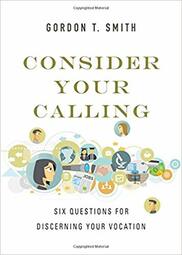My high school youth ministry meets for this first time this school year this Wednesday and this fall, we’re talking about vocation. In preparation for this series, I’ve been doing a ton of reading on vocation, including Gordon T. Smith’s fabulous Consider Your Calling: Six Questions for Discerning Your Vocation.

In Consider Your Calling, Gordon explores six questions that help people discern what the good work is that God is calling them to. As Gordon reminds his readers, “The goal of life is not less work but to know and embrace the good work to which we are called.” The six questions he explores in this book are:
1. What on earth is God doing?
2. Who are you?
3. What is your stage of life?
4. What are your circumstances?
5. What is the cross you will have to bear?
6. What are you afraid of?
As someone who works in a very different field (ministry) than what my degree is in (engineering), I appreciated Gordon’s exploration of who we are. According to him, “For most of us calling will, quite simply, make sense; it will fit us like a tailor-made piece of clothing.” That was certainly the case for me. My calling as a youth worker uses every single one of my gifts and gives me life in a way that I’m confident engineering never would have.
The first week of my vocation series with teens focuses on who they are. As such, I’ve found myself routinely thinking about this statement from Gordon: “Self-knowledge is not, then, an act of selfishness or self-centeredness, but an act of stewardship, of seeing ourselves in truth so that we can live in truth for Christ and for others.”
As someone who is in my late-thirties, even though my work focuses on young people, I also found Gordon’s chapter on “What is your stage of life?” particularly interesting. Gordon reminds those, like me, who are in their mid-adult years that “few things are more crucial to this stage of our vocational development than learning how to work with others… No one fulfills their vocation alone but only in interdependency upon others.”
I also loved Gordon’s vision for retirement. As I’ve watched family members age, I’ve found myself imagining what my retirement will look like. According to Gordon, “We retire to a new opportunity. Retirement is not an exit from but an entrance into what is maybe the most fruitful and satisfying chapter of our lives.”
As a Lutheran youth worker, I also really appreciated Gordon’s effort to connect vocation with baptism. According to him, “vocations are a vital means by which we fulfill our baptismal identity… Our vocation is now part of what it means to live in a way [that is] consistent with the meaning of our baptism, under the mercy of God, with ultimate allegiance to no other agency, authority, clan or nation than Christ.” I literally preached on baptism last week and yet I’ve never once considered its connection with vocation.
Without a doubt, Consider Your Calling is a helpful book for anyone interested in exploring vocation. Because of its short length, this book would be an easy one to discuss in a small group setting, even with high school or college students. But don’t let its short-length fool you. Consider Your Calling is packed with substance!
************************************************
Disclosure: I received a free copy of Consider Your Calling from InterVarsity Press in exchange for a fair and honest review.